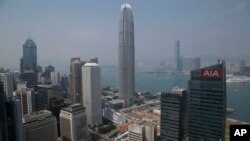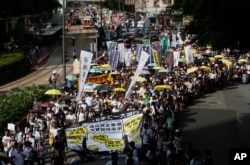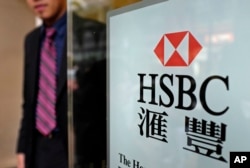Earlier this month, HSBC, the world's fifth largest bank, announced it would not move its headquarters from London to Hong Kong, leaving some to view the bank’s decision as a reflection of Hong Kong’s diminishing viability as a global financial center.
HSBC was headquartered in Hong Kong for more than 125 years, setting up shop in the city in 1865 as the Hong Kong and Shanghai Banking Corporation Ltd. The Tiananmen Square crackdown of 1989 raised concern among many of the firm’s leaders, and in 1993 the bank moved its headquarters to London. The bank said its February decision to keep its base in Britain is permanent.
The majority of HSBC’s business is in Asia, and a move to Hong Kong could have saved the firm billions of dollars. But mainland China’s growing influence over the city and recent political demonstrations may have discouraged the bank from shifting its headquarters.
Hong Kong Financial Secretary John Tsang Wednesday said it was recent “political volatility" that was threatening to undermine the local economy.
Demonstrations have rocked the city for the past two years. In 2014, millions of pro-democracy protesters blocked Hong Kong’s streets for several weeks, demanding direct elections of the city’s leader. This year protesters advocating for eventual independence from China have vowed to continue their demonstrations.
Over the Chinese new year holiday, a violent riot broke out in the city’s neighborhood of Mong Kok, when police attempted to clear illegal food stalls. Some protesters said the police actions were an attempt to erode local culture.
The disappearance of five Hong Kong booksellers, who published books critical of China, has also raised concerns, with the British government calling their detention in neighboring Guangdong Province by Chinese authorities a violation of Hong Kong’s “Basic Law.”
Despite the recent political unrest, leaders like Regina Ip, head of the pro-Beijing New People’s Party, said the city will remain an important financial hub.
“Some short term worries are understandable, but I think our city, as an international financial center, we have a long history of being a premier business and financial center. We have very strong foundations, underpinned by a very long history of rule of law,” she said.
Power of China attracts
While political turmoil may unnerve some financial firms, financial columnist Peter Guy said the growing economic power of mainland China is a bigger factor in Hong Kong’s future as a financial hub.
“China itself is developing as a country, as a group of financial centers. And it’s such a big country, that Hong Kong can’t possibly serve as a permanent gateway. It’s just like banks in the U.S. Citibank would not only have their head office in New York, but offices in Chicago, Houston, Los Angeles,” he said.
Thomas Chan, the head of the China Business Center at Hong Kong Polytechnic University, said Hong Kong will remain a vital gateway into the mainland for financial firms, and that China’s massive infrastructure initiative, called “One Road, One Belt,” will continue to draw investors and companies to the city.
Chan said, “Even the Japanese who departed Hong Kong after 1997 come again also to Hong Kong because of the RMB financial center, and also for the one country, one road strategy.”
Earlier this year Hong Kong’s chief executive CY Leung said Hong Kong would not only be a gateway for foreign firms to mainland China, but would become a “super connector” for Chinese firms investing abroad and expanding their global operations.






